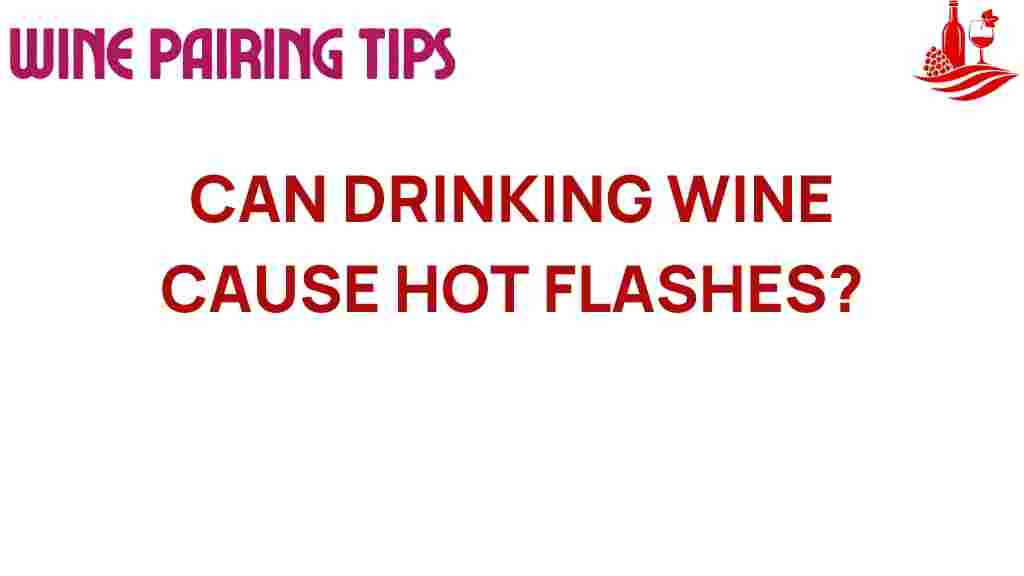Unveiling the Truth: Can Drinking Wine Trigger Hot Flashes?
As women approach menopause, they often experience a variety of symptoms, with hot flashes being one of the most common and frustrating. Many women seek relief and understanding of what influences these symptoms, including lifestyle choices such as wine consumption. In this article, we will explore the relationship between wine and hot flashes, the health effects of alcohol on women’s health, and practical tips for managing these symptoms during menopause.
Understanding Hot Flashes
Hot flashes are sudden feelings of warmth, often concentrated in the upper body, that can cause sweating and discomfort. They are a hallmark symptom of menopause, affecting about 75% of women during this transitional phase. Understanding the triggers and symptoms is essential for managing this condition effectively.
- Intensity: Hot flashes can range from mild warmth to intense heat.
- Duration: Each episode typically lasts from a few seconds to several minutes.
- Frequency: Some women may experience hot flashes multiple times a day, while others may have them less frequently.
Wine Consumption and Hot Flashes
When it comes to wine consumption, many women wonder if drinking wine can trigger or exacerbate hot flashes. The evidence is mixed, but understanding the potential effects of wine on your body during menopause is crucial.
Alcohol and Hormones
Alcohol, including wine, can influence hormone levels in the body. During menopause, estrogen levels fluctuate, leading to symptoms such as hot flashes. Research suggests that:
- Alcohol may elevate estrogen levels temporarily, which could impact the frequency and severity of hot flashes.
- Some studies indicate that women who drink alcohol, particularly red wine, report fewer hot flashes than those who abstain.
- Excessive alcohol consumption can lead to dehydration, which may worsen hot flashes.
Individual Responses to Wine
Every woman’s body reacts differently to alcohol. Factors that can influence how wine affects hot flashes include:
- Personal tolerance: Some women may find that even small amounts of wine trigger symptoms.
- Type of wine: Red wine, white wine, and sparkling wines may have different effects on hot flashes.
- Overall diet: A balanced diet can mitigate some of the negative effects of alcohol.
Health Effects of Wine on Women’s Health
Understanding the broader health effects of wine consumption is essential. Moderate wine consumption may have some health benefits, but it also poses risks, especially for women during menopause.
Potential Benefits
Moderate consumption of wine, particularly red wine, has been associated with certain health benefits:
- **Heart Health**: Some studies suggest that red wine can improve cardiovascular health due to antioxidants like resveratrol.
- **Reduced Risk of Osteoporosis**: Moderate alcohol consumption may support bone density, which is crucial for menopausal women.
Potential Risks
On the flip side, excessive wine consumption can lead to various health issues:
- **Weight Gain**: Alcohol is calorie-dense, contributing to weight gain, which may exacerbate hot flashes.
- **Increased Risk of Breast Cancer**: Some studies indicate a higher risk of breast cancer with increased alcohol consumption.
- **Sleep Disruptions**: Alcohol can interfere with sleep quality, leading to increased fatigue and irritability.
Managing Hot Flashes: Tips and Tricks
Whether you enjoy wine or prefer other beverages, managing hot flashes is essential for maintaining your quality of life. Here are some tips to help you cope:
1. Monitor Your Triggers
Keeping a diary of your symptoms and what you consume can help identify triggers. Pay attention to:
- Types of wine or alcohol consumed.
- Other dietary factors, such as caffeine and spicy foods.
- Environmental factors, such as temperature and stress.
2. Moderation is Key
If you enjoy wine, moderation is crucial. Aim for no more than one glass per day, and consider the following:
- Choose lower-alcohol wines.
- Stay hydrated with water or non-caffeinated beverages.
3. Explore Alternatives
If you find that wine exacerbates your hot flashes, consider alternatives:
- Mocktails: Enjoy non-alcoholic cocktails made with fresh juices and herbs.
- Herbal Teas: Some herbal teas, like peppermint or chamomile, may help soothe symptoms.
4. Lifestyle Changes
A healthy lifestyle can significantly impact hot flashes. Consider implementing the following:
- Regular Exercise: Engage in activities like walking, yoga, or swimming to promote overall health.
- Balanced Diet: Focus on whole foods, including fruits, vegetables, whole grains, and lean proteins.
- Stress Management: Practice relaxation techniques such as meditation, deep breathing, or mindfulness.
Conclusion
In conclusion, the relationship between wine consumption and hot flashes is complex and varies from person to person. While moderate wine consumption may not trigger hot flashes for everyone and may even offer some benefits, it’s essential to be mindful of how your body reacts. Understanding the health effects of alcohol on women’s health and making informed lifestyle choices can help manage symptoms effectively.
As you navigate this phase of life, consider keeping a journal to track your symptoms and potential triggers, including wine. By taking control of your lifestyle and dietary choices, you can better manage hot flashes and enhance your overall well-being during menopause.
For more information on managing menopause symptoms, you can check out this resource. If you’re looking for alternative beverages that won’t trigger symptoms, explore these options here.
This article is in the category Tips and created by Wine Pairing Tips Team
